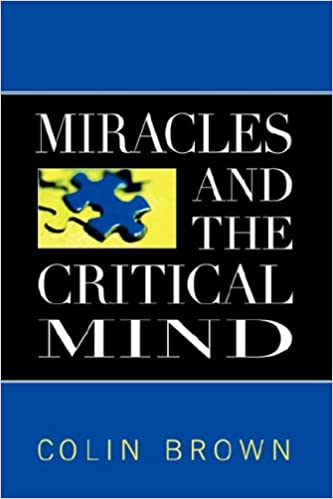A Brief Book Summary from Books At a Glance
By Steve West
About the Author
Colin Brown taught systematic theology at Fuller Theological Seminary and wrote several important books on theology and philosophy.
Introduction
Miracles and the Critical Mind examines how the biblical accounts of miracles have been treated philosophically, apologetically, and theologically through history. Brown fairly represents the positions of apologists and skeptics, conservatives, and liberals. This is a balanced and informed treatment of the subject.
Table of Contents
Part 1 Prologue: The Prescientific Age
Part 2 The Rise of Skepticism
Part 3 The Legacy of the Nineteenth Century
Part 4 The Ongoing Debate
Part 5 Postscript: A Question of Perspective
Summary
Part 1: Prologue: The Prescientific Age
Thinking Christians cannot avoid apologetics. At different times throughout church history miracles have sometimes been seen as clear proof of the truth of Christianity, and at other times almost as an encumbrance to credibility. For the first three centuries of the church miracles were often appealed to as proof of the faith. They were considered necessary evidence to have convinced people about the nature of Christ during his lifetime, as well as necessary to convince people of the authenticity of the apostles. Many early skeptics did not deny the miraculous, but they interpreted it as magic or demonic. Christians replied by putting the miraculous back into the context of Jesus’ life, teaching, and mission. Origen argued that Jesus’ miracles fulfilled prophecy.
Augustine observed that the miracles of Jesus did not merely produce wonder, but they also produced benefit. The difference between miracles and ordinary events is not whether God is working, but in the rarity of the occurrences. It is possible that God designed creation to bring about rare events at a particular time. Augustine did not ground faith on miracles, but he interpreted miracles through the Christian worldview. Aquinas followed Augustine’s chief points but argued that miracles are not an acceleration of natural processes but rather a suspension of them.
[To continue reading this summary, please see below....]The remainder of this article is premium content. Become a member to continue reading.
Already have an account? Sign In
